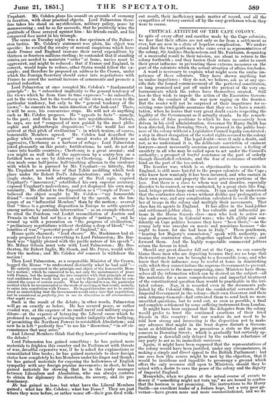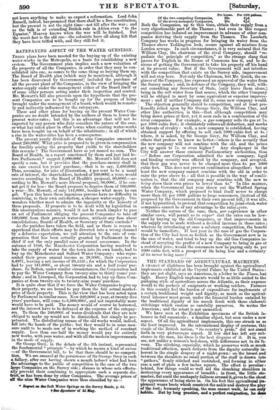CRITICAL ATTITUDE OF THE CAPE COLONY.
Ix spite of every effort and sacrifice made by the Cape colonists, we fear that their affairs are not only as far from a settlement as ever, but are now in a state of hopeless complication. We under- stand that the two gentlemen who came over as representatives of the colony, Sir Andries Stockenstrom and Mr. Fairbairn, despoiling of a successful result to their mission, are about to return to the colony forthwith ; and they hasten their return in order to exert their great influence in preventing those extreme measures on the part of the colonists which the actual situation of affairs forebodes.
A word is necessary to explain what might seem the undue im- patience of these colonists. They have shown anything but an undue impatience : they do not, we believe, ask as at any spe- cific date the formal commencement of the perfected constitution, so long promised and put off under the pretext of the very em- barrassments which the rulers have themselves created. Still less do they wish to impede the action of the Executive Govern- ment in the conduct of the war now raging on the frontier. But the reader will not be surprised at their impatience for re- ceiving some intelligible assurance that they are to have a consti- tution, when he learns that very great doubt exists respecting the legality of the Government as it actually stands. In the remark- able series of false positions to which he has successively been driven in his civil administration, Governor Sir Harry Smith has been directed, from Downing Street, to proceed in the public busi- ness of the colony without a Legislative Council legally constituted ; a step in direct derogation of the vested rights secured to the colony under the Great Seal. The legal doubt—were it only a doubt, and not, as we understand it is, the deliberate conviction of eminent lawyers—must necessarily occasion great uneasiness ; a feeling of unsafety in all who may be called upon to act wider the Council's authority; a prospect of lawful resistance on the part of orderly though dissatisfied colonists, and the fear of resistance of another kind on the part of the too ardent. The frontier war, which is so objectionable to economists in England, is still more hateful to the proper colonists of the Cape ; who know how wantonly it has been incurred, and who sustain in their own persons and property the most grievous portions of the loss. But there is a class to whom war and disorder, especially disorder to be coerced, or war conducted, by a great state like Eng- land, brings profits large and certain. It can easily be understood that the contractor class views without dislike any prolongation of the border war, and any complication calculated to swell the num- ber of troops in the colony and multiply their movements. That class has its agents in England. It has allies in the land-jobber and settlement-jobber class. It has valuable and influential pa- trons in the Horse Guards class—men who look to active ser- vice and promotion in Colonial wars' who talk glibly and con- fidently on Cape politics because they have "been there,"—as the young lady was oracular on music and musicians because "she ought to know, for she had been in Italy." These gentlemen, "bearing her ifajesty's commission," speak with authority, pa- tronize the contractor class, altogether applaud their views—and forward them. And the highly respectable commercial jobbers return the favour in kind.
Should any great disaster fall out at the Cape, we can scarcely blame those men who are departing because they see no hope that their exertions here can be brought to a favourable issue, and who know that their influence may be useful at home in diminishing evils which they cannot induce the supreme Government to prevent. Their ill success is the more surprising, since Ministers have them- selves all the information which can be desired on the subject—all the materials for a more comprehensive and impartial treatment of the constitutional question than would be practicable in the irri- tated colony. Nay, it is recorded even in the documents pub- lished by the Colonial Office, that the confidential servants of the Imperial Government in the colony—their own Governor and their own Attorney-General—had entreated them to send book no more unsettled questions, but to send out, as soon as possible a final and complete settlement by some sufficing instrument from London.
It might have been supposed that the delegates from the colony would prefer to trust the continued exertions of their tried friends in this country: but our readers do not need to be told how strong and increasing is the disposition not to make any advance that might in the least degree disturb a Govern- ment so debilitated and in so precarious a state as the present concern in Downing Street; which is gradually but certainly ap- proaching a downfall only delayed by the extreme reluctance of any party to act as its immediate successor.
Again, it might have been supposed that the representatives of the colony would have been justified, under any circumstances, in making a simple and direct appeal to the British Parliament : but one sees how this course might be met by the objection, that it would be invidious and impolitic to preoccupy a ground which offers the only recourse still open to Ministers, should they be seized with a desire to save the peace of the colony and the dignity of Imperial England.
Meanwhile, when we glance at the actual course of events to descry if "something might not turn up," we are bound to confess that the horizon is not promising. The instructions to Sir Harry Smith—an excellent leader of a forlorn hope, but a very poor go- vernor—have grown more and more unconstitutional, and we do
not learn anything to make us expect a reformation. Lord John Russell, indeed, has promised that there shall be a free constitution, but the present is not the right time—not till after the war; and as the talk is of extending British rule in Africa even "to the Equator," Heaven knows when the war will be finished. But the worst fact is the old one—the colonists have all along felt that they have been trifled -with, and they still feel it.



























 Previous page
Previous page